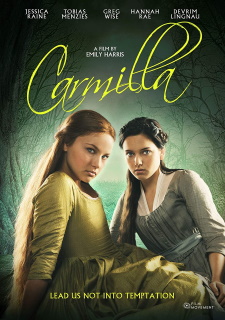

|
|
Carmilla
R0 - America - Film Movement Review written by and copyright: Eric Cotenas (13th October 2020). |
|
The Film
 Lara Bauer (Broadchurch's Hannah Rae) lives a lonely existence on a remote English country estate with her widowed father (Sense and Sensibility's Greg Wise) and her governess Miss Fontaine (Fortitude's Jessica Raine). Miss Fontaine oversees Lara's tutelage with a firm hand; so much so that Lara is quick to blame her "devilish" infraction of reading a forbidden book from her father's library for the reason that a long-awaited visit from the daughter of her father's friend must be postponed when the girl (whom Lara has never met) suddenly falls deathly ill. One night, Lara wakes to commotion and learns the next day that her father has taken in the only survivor of a carriage crash: a young woman (Auerhaus' Devrim Lingnau) who appears to be in shock and can provide no information about her family. Although the doctor (The Crown's Tobias Menzies) believes the girl's memory loss to be temporary, Miss Fontaine forbids Lara from visiting their guest. Lara, of course, cannot resist the temptation and steals away to see her in the middle of the night, giving her the name Carmilla. Troubled by erotic and violent nightmares influenced by her father's forbidden tomes, Lara is not quite sure her meeting with the girl was not also a dream until the recovered girl introduces herself to the household under the name Carmilla. The two become fast friends, but Miss Fontaine grows wary of the pair's fast friendship, especially after finding an occult text in the remains of the crashed carriage and is warned by the doctor that an epidemic of fear and superstition has spread from the village to the surrounding estates. The umpteenth adaptation of Joseph Sheridan Le Fanu's pre-Dracula vampire story "Carmilla" – recent adaptations include the British/Hungarian Styria and the Southern Gothic update The Unwanted (the second attempt in this milieu following the 1989 Nightmare Classics television adaptation) – Carmilla seems to strip away the more overt vampiric aspects of the novella to focus on the coming-of-age aspects of sexual curiosity, repression, and masculine authority; however, it does so in such a manner as if to blame the source story rather than the numerous more overtly horrific adaptations for obscuring the underlying themes. There are some stimulating ideas about the ways in which Miss Fontaine's harsh but seemingly benevolent treatment of Lara either seems to make her an instrument of male authority – particularly given the governess' vague references to her youthful mistakes and her relationship with Lara's father – as it might suggest her exerting what little authority she has on someone beneath her under the guise of a moral education (although Fontaine is never anything like the grotesque French governess of Le Fanu's other gothic "Uncle Silas") – and the contrast between Lara's lessons about reproduction through the pollination of flowers and her observation of the writhing, slimy, consuming and excreting fertilization of the Earth going on in the ground beneath – there is a wonderful overhead shot where kneeling Lara with her dress gathered close around her body looks like a rose that has not yet bloomed – however, much of the film plods along until a combination of the governess' superstition and Lara's active imagination in reaction and relation to each other leads to a Martin-like denouement. Performances are understated, with the female trio making the most impression while the males characters are almost blurred and obscured by the low-light, flaring, shallow depth-of-field photography of Michael Wood (The Beatles: Eight Days a Week - The Touring Years) in which inorganic things are desaturated near monochrome until masculine authority asserts itself in the climax and the last few images are sharper and composed head-on. Viewers unfamiliar with the Le Fanu story and its various adaptations might get more out of Carmilla while the initiated will have already gleaned some of the ideas explored here from other less-subtle takes.
Video
Shot in low light with flaring lenses and shallow depth-of-field with desaturated colors hovering near monochrome - a combination of grading and production design - the progressive, anamorphic widescreen encode copes with the image as best it can (a Blu-ray encode might have allowed better assessment of the film's textures and teased out more detail from the image, but Film Movement's DVD appears to be the only current edition of the film).
Audio
The Dolby Digital 5.1 and 2.0 stereo tracks are very similar, front-oriented with the 5.1 surrounds or surround decoding of the 2.0 track spreading out ambience and some subtle sound design. English Closed Captioning is available.
Extras
Extras start off with a behind the scenes segment (27:05) in which director Emily Harris discusses the three-year gestation of the project, the support of producers Lizzie Brown and Emily Precious, casting leads Rae, Fontaine, and Lingnau (via a videotape audition sent from Germany), the photography of Wood in conjunction with the work of productiond designer Alexandra Walker, while an interview with costume designer John Bright is interrupted by a visit form actor Wise who comments on the wardrobe for his character. The film's trailer (1:44) is also included along with "Three Towers" (11:53), a short film by Harris and Jonathan Bentovim, as well as trailers for six other Film Movement titles.
Packaging
The inside of the cover includes a paragraph on why Film Movement selected the film and another paragraph text extract from an interview with director Harris.
Overall
Viewers unfamiliar with the Le Fanu story and its various adaptations might get more out of Carmilla while the initiated will have already gleaned some of the ideas explored here from other less-subtle takes.
|
|||||

|